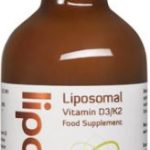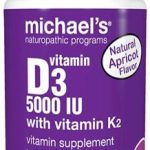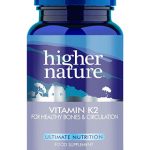It’s fair to say we need a generous helping of vitamins and minerals in our diet to ensure we remain healthy and our body functions as it should. In that regard then, is there one vitamin or mineral that’s more important than another? Well, it’s probably best not to look at it that way. Do two or more of these nutrients go together better than the others? Again, it’s surely best to try and consume as many of them as possible. And yet, that said; there are two specific vitamins that do seem to pair off particularly well – and to that end are often available together as a natural supplement – the Vitamins D and K2.
So much so, in fact, that it’s been said these two nutrients almost seem to engage in a delicate dance with one another – each, for example, complementing and enhancing the work of the other in slowing the progression of arterial calcification, thanks in part to combing to generate and activate matrix gla protein (MGP), which likes to mass around the arterial lining’s elastic fibres.
And, don’t doubt it; individually Vitamin K2 and Vitamin D (especially in the form of D3, which is readily available in supplementation with the former nutrient) do outstanding, nay utterly imperative work in the body. The following are just some examples.
Vitamin D benefits
Known far and wide as the ‘sunshine vitamin’, owing to the fact exposure to the sun will ensure it’s absorbed into the body, Vitamin D’s hugely beneficial throughout the human anatomy. Some of the best examples of which are:
- Neurological health – recent research seems to have established a correlation between Vitamin D deficiency and Alzheimer’s disease. Given there are in excess of 35 million sufferers of Alzheimer’s across the globe and it’s believed as many as 90% of these people experience low levels of vitamin D in their bodies, it’s surely fair to say the likelihood there’s a connection between the two entities is high. Indeed, one study discovered the lowest incidence of Alzheimer’s among elderly women was experienced by the 20% of them subjected to the highest Vitamin D intake1.
- Autoimmune support – for reasons that aren’t entirely clear, the number of autoimmune disorders seems to have spiked over the last few decades and one such condition that Vitamin D appears to combat effectively is rheumatoid arthritis (RA). Like other autoimmune conditions, RA sees the immune system tricked into attacking healthy body tissue – in this case, the body’s connective tissues. Indeed, the nutrient is such a strong immune system modulator that a study discovered when adult women consumed a multivitamin containing 400 IU/day of it, their risk of developing RA dropped by 40%. Moreover, another study found that high dosages of Vitamin D improved RA symptoms in an astonishing 89% of patients, while 45% of them experienced complete remission2.
- Cold and flu infections – thanks to its efficacy in interacting with the immune system, Vitamin D can also boost this first line of defence of ours when it comes to meeting and beating common infections; that is, cold and flu viruses. It’s believed this is because the nutrient’s great at stimulating the generation of potent peptides in both white blood cells and epithelial cells (the latter lining the respiratory tract), aiding the lungs’ protection from infection3. Additionally, a recent study among school children found that those who took 1,200IU/day of the vitamin enjoyed a reduction in ‘Influenza A’ during winter by 42% over those taking a placebo4.
Vitamin K2 benefits
Referred to by experts as menaquinone, Vitamin K2 is created in the body by the ‘good bacteria’ to be found lining the gastrointestinal tract and, from here, it journeys directly to bones, blood vessel walls and other tissues. As mentioned already, though, so critical a nutrient is this vitamin that you’re well advised to boost your dietary intake of it and not merely rely on your body for its generation. Here are some of its major benefits to convince you why:
- Heart protection – playing a significant role in the prevention of hardening arteries, Vitamin K2 then importantly contributes to staving off coronary artery disease and heart failure. Meanwhile, because (as noted above) the nutrient combines so well with Vitamin D to prevent calcification in coronary arteries, it also aids in preventing cardiovascular disease.
- Osteoporosis prevention – by helping to increase bone density thanks to effectively operating as a sort of biological glue ‘adhering’ calcium and other minerals within the bone matrix, Vitamin K2, it’s believed, contributes significantly to preventing the onset of osteoporosis (a bone fragility condition that may lead to fracture). This, in part, is because of trials conducted in Japan that found K2 supplementation resulted in vertebral fracture reductions by 60% and hip and other non-vertebral fracture reductions by 80%5. Moreover, while Vitamin K1 is believed to be effective in driving up levels of osteocalcin (which is responsible for bone-building), research suggests that K2 is, in fact, three times more effective in this activity6.
- Further benefits – as with Vitamin D, deficiency in K2 may contribute to the development of Alzheimer’s, thus boosted levels of K2 could aid in its prevention; it’s also believed K2 improves insulin sensitivity, may reduce bruising and contains antioxidant properties, while research suggests that those who consume K2 regularly may be at less risk of developing type 2 diabetes7.
Sources of Vitamins D3 and K2
As is widely known, sunlight’s a fantastic natural source of Vitamin D3, as it promotes synthesis of Vitamin D (in its different forms) from cholesterol in the skin. In terms of diet, you can boost your D3 intake through the likes of seafood like sardines, salmon, mackerel and tuna, as well as cod liver oil, raw milk and even caviar. Meanwhile, as far as Vitamin K2’s concerned, fermented foods are a great source; they can provide several milligrams of it if consumed daily – a good deal more than through eating dark green vegetables. That said; alternative K2-rich foods include the likes of soft cheeses, raw butter, ashard, kefir and sauerkraut.
Supplementation
Alternatively, of course, there’s always natural supplementation, which is a great source for both vitamins should you find yourself struggling to integrate the aforementioned foods into your regular diet. To wit, great Vitamin D3 supplements and Vitamin K2 supplements – some of them combined – available through us at The Finchley Clinic include:
Liposomal Vitamin D3/K2 (MK-7) – ensures both vitamins are delivered directly to the body’s cells; helps support the immune system, bones, teeth and joints.
Vitamin D3 5,000iu with Vitamin K2 – high-strength Vitamin D3 tablets with added K2 that can be chewed or taken sublingually, complete with a tasty apricot flavour (and certified kosher); aids both the skeletal and immune systems.
Vitamin K2 – highly bioactive and bio-available, this K2 supplement helps with normal blood-clotting and keeping bones strong and may help keep blood vessels healthy and maintain bone mass in post-menopausal women.
References:
1. Annweil C., Llewellyn D. J. and Beauchet O. ‘Low serum vitamin D concentrations in Alzheimer’s disease: a systematic review and meta analysis’. J Alzheimers Dis. 2013; 33 (3): 65974.
2. Schwalfenberg G. K. ‘Solar Radiation and Vitamin D: Mitigating Environmental Factors in Autoimmune Disease’. Journal of Environmental and Public Health. Volume 2012 (2012).
3. Ginde A. A., Mansbach J. M. and Camargo C. A. ‘Association Between Serum 25Hydroxyvitamin D Level and Upper Respiratory Tract Infection in the Third National Health and Nutrition Examination Survey’. Arch Intern Med. 2009; 169 (4): 384390.
4. Urashima M., Segawa T., Okazaki M., Kurihara M., Wada Y. and Ida H. ‘Randomized trial of vitamin D supplementation to prevent seasonal influenza A in schoolchildren’. Am J Clin Nutr. May 2010; 91 (5): 125560.
5. Cockayne S., Adamson J., Lanham-New S., Shearer M. J., Gilbody S. and Torgerson D. J. ‘Vitamin K and the Prevention of Fractures’. Arch Intern Med. 2006; 166: 1256-1261.
6. Schurgers L. J., Teunissen K. J. F., Hamulyak K., Knapen M. H. J., Hogne V. and Vermeer C. ‘Vitamin K-containing dietary supplements: Comparison of synthetic vitamin K1 and natto-derived menaquinone-7’. Blood. 2006.
7. Manna P. and Kalita J. ‘Beneficial role of vitamin K supplementation on insulin sensitivity, glucose metabolism, and the reduced risk of type 2 diabetes: A review’. Nutrition, Volume 32 (2016), Issue 7, pp. 732–739.



